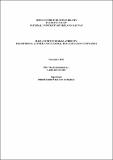| dc.description.abstract | Rwanda took the new, global norm of accountability to its logical extreme by putting more than one million, mostly low-level genocide suspects on trial. In doing so, Rwanda challenged the dominant model of accountability that privileges liberalism, legalism, retribution, individualism, and cosmopolitanism. Yet, even as gacaca deviated from this model, it reaffirmed the central nostrums of transitional justice: truth would lead to justice, and justice, in turn, would lead to reconciliation. This dissertation argues that gacaca largely failed to deliver on its stated goals of justice, truth, reparations, and reconciliation. First, gacaca fostered a culture of accusatory practices. Originally designed to deal with some 120,000 genocide suspects, gacaca unleashed a tsunami of accusations that led to trials against a million suspects. Second, gacaca was always meant to provide speedy justice on the cheap. But facing more than a million new accusations, the government had to increase the pace of hearings, sacrificing quality for quantity. That produced unfair trials which undermined truth-telling, justice, and civic trust. Third, gacaca imposed collective guilt for the genocide on the Hutu majority while ensuring impunity for war crimes and crimes against humanity committed by the Tutsi rebels now in power. That undercut its promise of justice and reinforced ethnic divisions. Fourth, gacaca was premised on voluntary participation but large numbers had to be coerced just to show up and, even then, mostly kept silent. That had a negative impact on truth-telling and trust. Finally, gacaca did not deliver sufficiently meaningful reparations to genocide survivors, which left many with a sense of injustice and a loss of civic trust. | en_US |
| dc.local.note | After the 1994 genocide, Rwanda launched the most ambitious, post-conflict justice mechanism ever attempted: 10,000 community courts (with more than 100,000 lay judges) put one million perpetrators on trial. This thesis examines why and how these courts failed to deliver on their promises of truth, justice, and reconciliation. | en_US |


